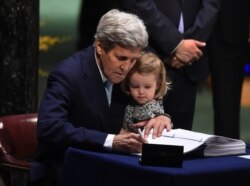The Paris Climate Agreement is approaching its five-year anniversary, marking the historic agreement among 196 nations including the United States to strengthen the global response to the threat of climate change by curbing international greenhouse emissions.
Republican President Donald Trump, who once dismissed climate change as a “hoax,” withdrew the U.S. from the pact earlier this year, arguing that it placed the country at an unfair economic disadvantage. But President-elect Joe Biden, who was President Barack Obama’s vice president when the Obama administration negotiated the deal, has pledged to rejoin the Paris climate agreement soon after being sworn in on January 20.
The climate plan being promoted by Biden and Vice President-elect Kamala Harris has been called the most ambitious of any U.S. administration yet, with a proposed $1.7 trillion investment into taking the world’s second-biggest carbon emitter to net-zero by 2050. Net-zero means the country would recapture or remove as much carbon as it emits.
After being projected the winner of the Nov. 3 presidential election, Biden appointed former Secretary of State John Kerry to be the country’s first-ever climate envoy.
The Biden transition team said that Kerry, who originally signed the Paris agreement on behalf of the U.S., will have a seat on the National Security Council, reflecting the incoming administration’s “commitment to addressing climate change as an urgent national security issue.”
According to the Pew Research Center, roughly two-thirds of Americans think that the government should be doing more to take on climate change, and Kerry agrees.
“Mr. President-elect, you've put forward a bold transformative climate plan. But you've also underscored that no country alone can solve this challenge,” Kerry said in Delaware as Biden introduced his national security team. “Failure is not an option. Succeeding together means tapping into the best of American ingenuity and creativity and diplomacy, from brain power to alternative energy power.”
While some major corporations support bolstering climate change policies at home, including Apple, Google, Goldman Sachs and Royal Dutch Shell, Kerry’s greatest task will be building trust internationally. After Trump’s rollbacks of numerous environmental regulations and exit from the Paris agreement, the U.S.’s credibility on climate change has faltered over the past four years.
Despite the incoming Biden administration’s declared plan to rejoin the pact, the U.S. will not participate when Britain and the U.N. host a climate summit on Dec. 12 to celebrate the anniversary of the COP21 climate change conference that resulted in the agreement.
In preparation for the five-year anniversary summit, British Prime Minister Boris Johnson announced recently that Britain by 2030 would cut emissions by at least 68% from 1990 levels. That would put the country on a path to achieving net-zero by 2050.
Johnson described the climate crisis as a “global effort” and encouraged fellow world leaders to propose their own ambitious plans to cut carbon emissions at the Dec.12 Climate Ambition Summit.
Britain isn’t alone in laying out ambitious targets. The European Union, which according to one study reduced carbon emissions by 24% between 1990 and 2019, has set a goal of being net-zero by 2050.
According to the European Commission’s emissions database, the seven countries that signed the Paris agreement but have not yet ratified it account for about 4% of global emissions. The United States is responsible for 13%, second only to China.
China, the world’s largest emitting country, has released a plan to become carbon neutral by 2060.
Robert Stavins, a professor at Harvard University’s Kennedy School of Government and director of the Harvard Project on Climate Agreements, thinks that goal is lofty but not out of reach.
“China’s 2060 goal of carbon neutrality is ambitious,” Stavins said in an email to VOA, “but given the nature of China’s political processes, it is achievable if very aggressive commands or incentive-based policies are put in place, beginning now.”
Nathaniel Keohane, the Environmental Defense Fund’s senior vice president of climate, told VOA in a written statement that China’s goal sends a signal to the rest of the world.
“The direction of travel on carbon emissions is no longer in doubt: the world is going to zero emissions. Now it's just a question of how soon we can get there,” he said.
China accounts for almost 30% of the world’s CO2 emissions and, according to researchers from Tsinghua University Institute for Climate Change and Sustainable Development, the country aim to achieve net-zero emissions by 2050 and seek to recapture more carbon than it emits in the following years.
In order to do so, more than 85% of all energy and 90% of all electricity will need to come from non-fossil energy sources by 2050. In addition, the country will have to find better ways to trap and absorb existing carbon emissions.
“The key question for China now is how it translates that 2060 target into near-term action in its next Five-Year Plan and an ambitious interim target in its Beautiful China 2035 initiative," said Keohane.
Even with 2060 far in the distance, Keohane said China must act quickly to offset its CO2 emissions long before then. “Achieving these temperature goals also depends on how much carbon dioxide is emitted along the path to net zero, making near-term action critical to success,” Keohane said.
To be on track to meet Biden’s goal of carbon-neutrality by 2050, the Rhodium Group estimates that the U.S. will need to cut emissions by 43% over the next decade.














